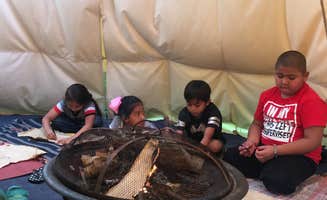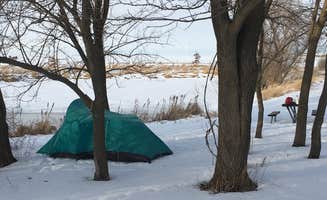Tent camping near Ottumwa, Iowa offers primitive outdoor experiences in the gently rolling hills of southeastern Iowa, where the Des Moines River creates numerous access points for fishing and paddling. The region averages 38 inches of rainfall annually, creating lush riverside vegetation but potentially muddy conditions during spring months. Most campsites sit at elevations between 600-850 feet above sea level, with seasonal temperatures ranging from below freezing in winter to humid 90°F days in summer.
What to do
Fishing opportunities: At Eldon Wildlife Management Area, anglers can access multiple stream fishing spots. "Small lot for hunters to park and go. For a secluded spot, good enough to camp. As long as you don't need any utilities," notes Chunk S. about the area's dual-purpose nature.
Paddling routes: The region offers several river access points for kayaking and canoeing. Most access points have unimproved launches requiring manual carrying of equipment over uneven terrain. Water levels fluctuate seasonally, with spring typically providing the most consistent flows for paddling.
Wildlife observation: Dawn and dusk provide optimal wildlife viewing times at most locations. Bring binoculars for spotting waterfowl along riverbanks or deer at forest edges. Many sites border agricultural fields that attract various bird species, particularly during migration seasons.
What campers like
Natural seclusion: Many campers appreciate the undeveloped nature of sites around Ottumwa. At Winter Camp at Walking Stick Adventures Farm, Ashley F. describes a "Private 4 Acre Site" where you can "Set up camp anywhere and relax under the stars."
Low traffic camping: The dispersed nature of camping areas means minimal crowding even during peak season. Sites along less-traveled roads provide quiet camping options away from highway noise. Local access points often see only a handful of visitors per day, even on weekends.
No reservation stress: Most public land camping around Ottumwa operates on a first-come basis without reservation systems. This allows for spontaneous trips without advance planning. During weekdays, finding available sites rarely presents a challenge even during summer months.
What you should know
Self-sufficiency required: Most primitive tent camping sites near Ottumwa lack basic amenities. Bring all water, food, and waste disposal supplies. Cell service can be spotty, particularly in low-lying areas near water.
Seasonal hunting activity: Be aware that many camping areas also serve as hunting zones during designated seasons. Manhattan Bridge Access and other similar sites see increased hunter traffic during fall and early winter. Wear bright colors when hiking during hunting seasons and check Iowa DNR regulations before camping.
Limited site maintenance: Expect minimal to no maintenance at most primitive sites. Some areas may have overgrown vegetation or debris depending on recent weather and usage patterns. Before setting up camp, carefully check for poison ivy, which grows abundantly in the region, particularly near riverbanks.
Tips for camping with families
Safety planning: When tent camping with children near Ottumwa, establish clear boundaries around water access points. Rivers can have unpredictable currents and muddy banks. Bring extra clothing as humidity levels often create damp conditions overnight.
Entertainment options: Pack nature identification guides specific to Iowa flora and fauna. Quercus Wilderness Area offers several short walking paths suitable for children to explore native plant species. Consider bringing insect nets for catching and releasing butterflies, which are abundant in summer months.
Weather preparedness: Summer thunderstorms develop quickly in this region. Bring tarps or shelters that can be quickly deployed when clouds build. The clay-rich soil around Ottumwa can become extremely muddy after rain, so pack extra footwear and ground cloths.
Tips from RVers
Access limitations: Most primitive camping sites near Ottumwa cannot accommodate RVs due to narrow access roads and lack of designated parking areas. Cedar Creek Access and similar locations have unimproved roads that become impassable for larger vehicles after rain.
Alternative options: RV campers should consider established campgrounds slightly further from Ottumwa. These provide electrical hookups and more suitable access roads. The closest full-service RV campgrounds are approximately 25-35 miles from central Ottumwa.
Day-use strategy: RVers staying at established campgrounds can use primitive areas for day activities. Park at designated access points and explore by foot. Most river access areas have small parking lots suitable for temporary vehicle parking during daylight hours.



